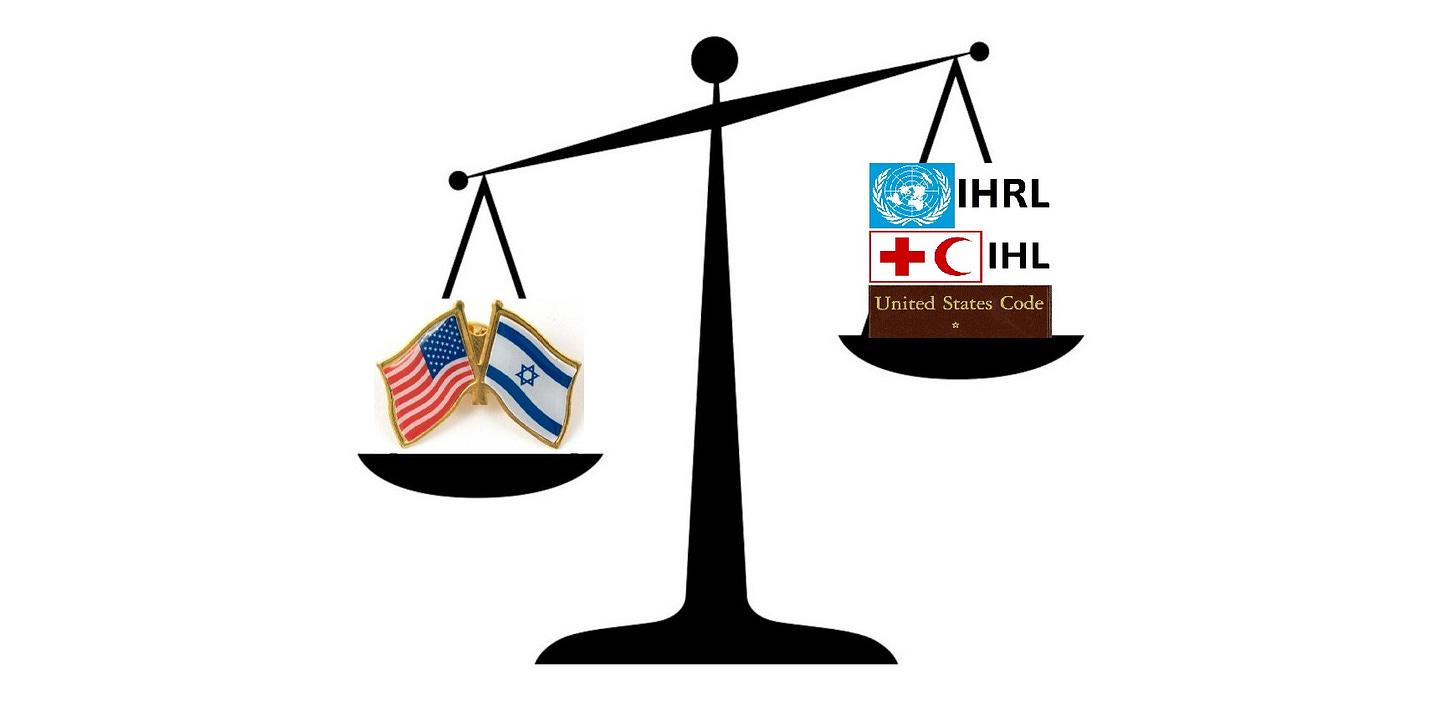Exemptionalism in action: the U.S. and Israel/Gaza
America’s moral authority is shredded by double standards on applying U.S. and international law
The raison d'être of this newsletter/blog is that the ideal of an exceptional America that is a moral voice for human rights and democracy in the world suffers from the double standards and hypocrisies in our foreign policy. “Unexemptional” is the vision for a better and values-based foreign policy.
There is no clearer example of exemptionalism than current U.S. policy toward Israel in its military action in Gaza. But I haven’t written on the conflict since October 23. There’s a reason for that. I’m in a job where it is prudent for me not to write too much about the things Members of Congress and Administration officials are saying, or about active legislation.
But I need to write this. I need to express my feelings about the damage we have done to our credibility and moral authority. Some day we will look back at Gaza, along the 2003 invasion of Iraq, as the two massive, avoidable, rule-flouting mistakes of the early 21st century that shattered America’s reputation around the world.
I am far from the only person to hold this position. Just a few examples include: Nicholas Kristoff’s “Israel, Gaza and Double Standards, Including Our Own,” International Crisis Group’s Richard Gowan’s “The Double Standards Debate at the UN,” CNN’s Christine Amanpour on double standards in her network’s coverage, Ishaan Tharoor’s “In Ukraine and Gaza, twilight for the ‘rules-based order’,” Le Monde Diplomatique’s Benoît Bréville on “Ukraine and Gaza: double standards,” and Human Rights Watch’s Elizabeth Evanson on the double standards on international justice mechanisms (ICC and ICJ).
Lots of people in government feel this too, as I wrote in “The professionals’ revolt against foreign policy double standards” (which has been reinforced by my personal interactions). There have been plenty of stories since, including “‘Extraordinary’: Biden administration staffers’ growing dissent against Gaza policy.”
None of this is to excuse or in any way defend what Hamas did, which I called truly sickening on October 10. Israel had a right to respond to a terrorist attack with military force. But its government decided its response would be unencumbered by the laws of armed conflict. And the U.S. government chose to unconditionally support that approach, international law be damned. Many in this country, including a lot of Jewish-Americans, objected to the notion that one war crime justified another. But political leaders (most, but certainly not all) did not object, and now the United States finds itself simultaneously penalizing those who commit war crimes in one region while subsidizing those who commit war crimes in another.
How can the United States hope to get other nations to join its determination that China is committing genocide against Uyghurs and other Turkic Muslims when it summarily dismisses South Africa’s case to determine whether Israel is committing genocide as “meritless?”
How seriously should other countries take the United States’ condemnation of Sudan’s military blocking humanitarian assistance when it refuses to use its leverage to get the government of Israel to stop blocking humanitarian assistance into Gaza?
Why should we expect other countries to respond to U.S. appeals to respect human rights and humanitarian law in conflict when the United States declines to apply to Israel its own laws that require consequences for violations of human rights and humanitarian law?
Why should foreign militaries make an effort to comply with U.S. legal requirements to ensure that the weapons they receive from the U.S. are not used to commit human rights abuses when the U.S. government refuses to enforce compliance on Israel?
How can the United States hope to deter other countries from justifying human rights abuses as counter-terrorism measures when the U.S. government stays silent as the Israeli government justifies its international law violations in the name of countering terrorism?
How can we expect the rest of the world to unite against Russia’s illegal (under international law) occupation of Ukrainian territory when the United States tolerates, if not willingly endorses, Israel’s illegal (under international law) occupation of Palestinian land?
Take a moment to ponder these questions (we could ask dozens more questions like this). How would you answer? How do you expect U.S. government and elected officials to answer?
What is to be done? As for principle, insist on it. That means having U.S. policy toward all sides be grounded in international and U.S. law, rather than exemptions to them. As for the larger and deeper conflict, that is not for today, and I am not qualified to address what is a severely complicated and intractable problem. But what I can say is that approach should be guided by the first paragraph of the first article of the two core international covenants of human rights law (on Civil and Political Rights, and on Economic, Social and Cultural Rights):
Article 1
1. All peoples have the right of self-determination. By virtue of that right they freely determine their political status and freely pursue their economic, social and cultural development.


